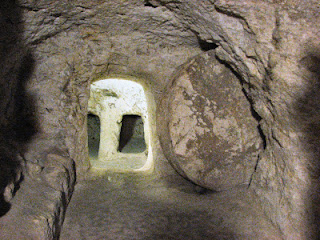"He has been raised!" He has been raised, indeed!
There is a popular declaration among Christians the world over this time of year. Quoting the messenger at Jesus’s tomb the declaration is made, “His is risen!” And then people respond: “He is risen indeed!”.
But that English declaration is not so accurate, and can even be deceiving. The angelic declaration about Jesus is not about what Jesus did, but about what someone else, namely God, did to Jesus. In Greek, the declaration has passive verb. Jesus was acted upon by someone else. Jesus received the action of the verb in the sentence. A more correct declaration is “He has been raised!” or, “He was raised!”. That is, someone else raised Jesus.
“He has been raised!” (Passive verb)
Matthew
28:5-7 (Mark 16:6, Luke 24:6)
5
But the angel said to the women, "Do not be afraid; I know that you are
looking for Jesus, who was crucified.
6 He is not here, for he has
been raised, just as he said. Come and see the place where he was lying.
7 Then go quickly and tell his
disciples, 'He has been raised from the dead. (NET)
NET
note: “The verb here is passive (ἠγέρθη,
eÒgertheÒ). This "divine passive" (see ExSyn 437–38)
points to the fact that Jesus was raised by God.”
REV Matthew 28:6 translation
and commentary gets the passive verb right.
So does
the Complete Jewish Bible and Common English Bible:
Matthew
28:6 He is not here, because he has been raised- just as he said!
Unfortunately,
the NET Bible failed to translate the passive verb correctly in the previous chapter, Matthew 27:63. The religious leaders speaking to Pilate: "Sir (Lord), we remember that while that
deceiver was still alive he said, 'After three days I will rise again.' The
verb again is passive: “I will be
raised” (CJB gets it right, CEB wrong). Compare Matthew 17:23, 20:19, “They
will kill him, and on the third day he will be raised" (passive).
Active
or Middle Voice “rise”
There
are a few places in the New Testament where an active verb, or what in Greek is
called a “middle” voice, are used in
describing the rising of Jesus from the dead. A couple examples:
Luke
18:33 they will scourge him and kill him, and on the third day he will
rise." (RSV) - verb indicative future middle
Luke
24:7 that the Son of man must be delivered into the hands of sinful men, and be
crucified, and on the third day rise." (RSV) - verb infinitive aorist
active from ἀνίστημι
Some
deity of Christ believers like to point to verses like these to claim that
Jesus raised himself from the dead. But this is a mistake, for several reasons:
1) Insisting that Jesus raised himself from the dead creates a contradiction
with the multitude of Scriptures, some which I’ll mention in just a minute that
declare that God, someone else other than Jesus, specifically, the Father, raised
Jesus from the dead. And, claiming that Jesus raised himself from the dead
creates contradictions with the other Scriptures like the ones we just
described where Jesus is said to be acted on from the outside, that he was raised
from the dead (passive) by someone else. The Bible is not presenting a confusing
contradiction that says that both Jesus and someone else raised Jesus from the
dead. Either Jesus, or someone else, gave life again to Jesus. It can’t be
both.
2) The
confusion is partly connected to the action related to the word raise, rise, be
raised. While “rising from the dead” is a good metaphor for coming out from the
dead, the question is really who gives the life that enables one to rise from
the dead. We see the same active sense
where other people in addition to Jesus also take a active role
in “rising from the dead”, but they are obviously not the ones who gave
themselves the life that enable them to rise from the dead.
John
11:23 Jesus said to her, "Your brother will rise." (RSV) “come
back to life again” - verb indicative future middle
Mark
12:25 For when they rise from the dead, they neither marry nor are given
in marriage, but are like angels in heaven. (RSV) - verb subjunctive aorist active
The
minority of biblical verses that describe the role of Jesus “rising from the
dead” are in the same category of other human beings who are described in the
same way. God gives life, and then people can “rise” from the dead.
3)
Another reason that it is wrong to claim that Jesus raised himself from the
dead is that the overwhelming declaration of the Bible is that God, someone
other than Jesus, gave life again to Jesus, or raised Jesus from the dead. There
are over 30 places in the New Testament that explicitly state that God
- a singular person who is differentiated from the Lord Jesus Christ - that
God raised Jesus Christ from the dead. Here are a few examples:
Acts
2:22-24 "Men of Israel,
hear these words: Jesus of Nazareth, a man attested to you by God with
mighty works and wonders and signs that God did through him in your
midst, as you yourselves know- 23
this Jesus, delivered up according to the definite plan and foreknowledge of
God, you crucified and killed by the hands of lawless men. 24 God raised him up,
loosing the pangs of death, because it was not possible for him to be held by
it.
Acts
2:32 This Jesus, God raised up, and of that we all are witnesses.
Acts
3:15 you… put to death the Prince of life, the
one whom God raised from the dead,
Acts
4:10 Jesus Christ of Nazareth, whom you crucified, whom God raised from the
dead-
Acts
5:30-31 The God of our fathers raised Jesus, whom you killed by hanging
him on a tree. 31 God
exalted him at his right hand.
Acts
10:39-40 They put him to death by hanging him on a tree, but God raised him
on the third day and made him to appear
Acts
13:30 But God raised him from the dead,
1
Corinthians 6:14 And God raised the Lord and will also raise us
up by his power.
Galatians
1:1. “… God, the Father, who raised him from the dead…”
Colossians
2:12 …through faith in the powerful working of God, who raised him
from the dead.
Note
that in all the passages quoted above, and in many more like it, God, a
singular person, God entire, all of God, is distinguished from “Jesus”,
“Christ”, or “him” - the one whom God raised up. The one whom God raised up was
not God, but is distinguished from God.
Jesus
was raised - Passive
And
then, like the “Easter” greeting mentioned above, there are many more
Scriptures that describe Jesus as being acted upon in a passive
sense in his resurrection, meaning, that Jesus was acted upon by God, like
this:
Romans
6:9 We know that Christ being raised
from the dead will never die again; death no longer has dominion over him.
1
Corinthians 15:17 (13, 14, 16, 20) And if Christ has not been
raised, your faith is futile and you are still in your sins.
There
are lots more examples. To claim or believe that Jesus raised himself from the
dead contradicts all these scriptures that directly state that God raised him from
the dead, and that Jesus was raised (passive) from the dead.
Did God
die?
Mainstream Christianity seems to be confused as to just who died on that cross some
2000 years ago. I hear conflicting claims. Often people, even preachers, will
say that “God died”, like the Charles
Wesley hymn, “Amazing love! how can it be, That thou, my God, shouldst die
for me?”
Or Max
Lucato, touted as a New York Times Best Selling (Christian) Author who
posted recently about a book he wrote saying: “God is on a cross. The Creator
of the universe is being executed. It is no normal six hours… it is no normal
Friday.”
Folks,
if your theology brings you to a place where you think God died, you better
re-think your theology. Such a claim is completely non-biblical, contradictory to
the Bible. The Bible says categorically that God is immortal. God does not die (Rom.
1:23, 1 Tim 1:17 “immortal, invisible, the only God”, 1 Tim. 6:16).
Other
Christians will say, “Well, it was only the human Jesus who died, or the
humanity of Jesus who died”. My response
is that a dual-natured Jesus is made-up figment of peoples’ imagination, and he
is a liar. The Bible never says the God-man who died is our mediator. The Bible
only says the man Christ Jesus died and is our mediator (e.g., Rom. 5:15, 1
Cor. 15:21, 1 Tim 2:4-5).
I suggest that the so-called dual-natured, fully-god-fully-man Jesus of mainstream Christianity is a dual-minded liar. Ask your Jesus a question: Did you die? If
your Jesus says “No (the god Jesus) and yes (the human Jesus)”, he is a liar
and is not the biblical Jesus. If your Jesus hesitates and has to explain how
something of him died but something else of him didn’t die, you have a lying, false
Jesus.
The
biblical Jesus of Nazareth, the son of God, the Lord Messiah declares for all
to hear: “I was dead” (Rev. 1:18).
Dishonoring
the man, the human person, Jesus of Nazareth
Let’s
not dishonor the Lord Messiah, the man Jesus who died for us, and give credit
to some imagined “god” who took on a human nature, then for a short while
supposedly shed himself of that human nature, and then again supposedly put
that human nature back on – a re-incarnation.
Instead,
may we declare with grateful and confident hearts what the messengers at the
tomb that new morning declared: “He has been raised!”. He has been raised indeed!
Two
verses in John’s Gospel: Did
Jesus Raise Himself from the dead?” One God Report Podcast #14
Web
resources for this episode:
NET Translation
and Note on Matthew 28:6
https://netbible.org/bible/Matthew+28
Revised
English Version note on Matthew 28:6
https://www.revisedenglishversion.com/Matthew/28/6
Did
Jesus Raise Himself from the Dead?
https://landandbible.blogspot.com/2020/04/did-jesus-raise-himself-from-dead-john.html
Charles
Wesley Song
https://www.invubu.com/music/show/song/Charles-Wesley/And-Can-It-Be%252C-That-I-Should-Gain.html
Max Lucato
quote
https://www.facebook.com/photo/?fbid=762063085288722&set=pb.100044551114485.-2207520000.



Comments